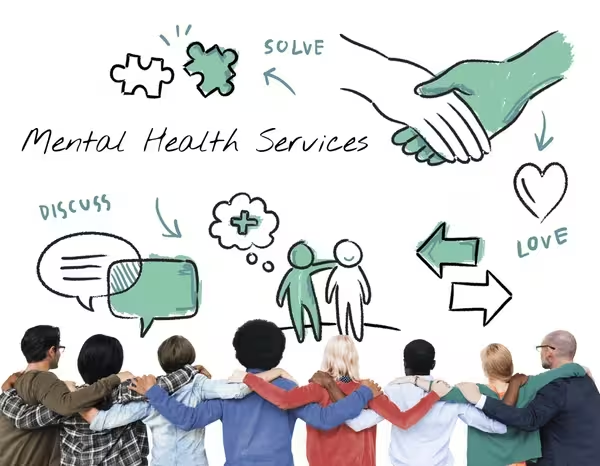Importance of Social Connections
Social connections play a vital role in promoting overall wellbeing. The impact of social connections on human health cannot be overstated, with social isolation and loneliness being viewed as risk factors that can surpass common behavioral risk factors like smoking, poor diet, lack of exercise, and obesity. Building and maintaining social connections is essential for fostering a healthy and fulfilling life.
Impact on Human Health
Scientific research has shown that social connections have powerful effects on our health and can influence our biology and wellbeing. Individuals who lack social connections or feel socially isolated are at increased risk of experiencing negative mental health outcomes such as depression, anxiety, and cognitive decline. In fact, loneliness and social isolation have been linked to a range of detrimental effects on both mental and physical health.
Loneliness and social isolation can have profound effects on an individual’s mental health, contributing to feelings of despair, low self-worth, and reduced quality of life. Prolonged loneliness has also been associated with an increased risk of disease, illness, and mortality. In fact, the impact of loneliness on health can be as harmful as smoking 15 cigarettes per day. Recognizing the importance of social connections is crucial in addressing mental health concerns and promoting overall wellbeing.
Social Isolation and Loneliness
Social isolation and loneliness can have detrimental effects on mental health. Without awareness, development, and maintenance of social connections, individuals are at risk of becoming socially isolated, which can contribute to a decline in mental wellbeing. The negative impact of social isolation and loneliness can be seen in various aspects of life, including relationships, work, and overall satisfaction.
To overcome social isolation and loneliness, it is important to actively seek and nurture social connections. This can involve reaching out to family, friends, neighbors, and other social groups. Engaging in social activities and participating in community events can also help combat social isolation. By promoting social engagement and fostering meaningful connections, individuals can enhance their mental health and overall wellbeing.
In summary, recognizing the importance of social connections for wellbeing is crucial. Social isolation and loneliness can have profound effects on mental health, while supportive social relationships can contribute to living healthier and longer lives [5]. By understanding the impact of social connections, individuals can prioritize building and maintaining strong social bonds, leading to improved mental wellbeing and a higher quality of life.
Social Connections and Well-Being
Recognizing the importance of social connections for overall well-being is crucial. Our links to others can have a profound impact on our health and biology, influencing various aspects of our well-being. Let’s explore the social support benefits and how social connections help us cope with life’s challenges.
Social Support Benefits
Building and maintaining social connections provide us with a valuable source of social support, which plays a vital role in our mental and physical health. Research has shown that connecting with others, known as social support, can help improve our health and encourage positive lifestyle changes.
Social support has been linked to a range of health benefits, including improved mental health, reduced stress levels, and increased overall well-being. It can also help individuals adopt healthier behaviors and make positive changes to their lifestyle. Having a strong support system can provide a sense of belonging, reduce feelings of loneliness, and enhance self-esteem.
Coping with Life’s Challenges
Strong social connections are particularly important when it comes to coping with life’s challenges. Children with secure and supportive relationships with their caregivers are more likely to develop resilience and effectively navigate the hurdles they encounter. Similarly, adults who have a network of supportive relationships are better equipped to face and overcome difficult situations.
During times of stress, having a support system can provide emotional support, practical assistance, and guidance. Being able to share our concerns, seek advice, or simply have someone to lean on can make a significant difference in our ability to cope with various stressors. Moreover, social connections can provide a sense of perspective, offering different viewpoints and helping us find solutions to problems.
By fostering strong social connections, we create a network of support that can help us navigate life’s ups and downs. Whether it’s family, friends, romantic partners, or other relationships, these connections contribute to our overall well-being. To learn more about building resilience and improving mental health, check out our articles on building resilience for better mental health and benefits of mindfulness for mental health.
Recognizing and nurturing the importance of social connections can have a profound impact on our mental and physical health. By actively seeking and maintaining healthy relationships, we strengthen our overall well-being and create a support system that helps us thrive.
Types of Social Relationships
Social relationships play a crucial role in our overall well-being. They provide a sense of belonging, support, and connection that contributes to our mental health. There are various types of social relationships, each offering unique benefits and contributing to our overall well-being. Let’s explore two important types: family and caregivers, and romantic partners and friends.
Family and Caregivers
Family and caregivers form the foundation of our social connections. Strong connections with family members, such as parents, siblings, and children, have a profound impact on our well-being. Research conducted by the National Institutes of Health suggests that children with strong connections to their caregivers are more likely to develop the necessary skills to cope with life’s challenges [2].
Being part of a supportive family unit provides a sense of security, love, and acceptance. Family members often offer emotional support, encouragement, and guidance through life’s ups and downs. They can be a source of comfort, understanding, and companionship, helping us navigate through difficult times.
For individuals who require caregiving assistance due to physical or mental health challenges, caregivers play a vital role in providing support and enhancing well-being. Caregivers offer assistance with daily activities, provide emotional support, and contribute to a sense of stability and comfort. Their presence and care contribute significantly to the overall well-being of those they support.
Romantic Partners and Friends
Romantic partners and friends are essential sources of social connection and support. Having a romantic partner or close friends can positively impact our mental health and well-being. Social relationships have been associated with various health benefits, with studies showing that individuals who are more socially connected tend to be healthier and live longer.
Romantic partners provide companionship, emotional support, and intimacy. They offer a safe and trusting space to share our thoughts, feelings, and experiences. A healthy romantic relationship can promote happiness, reduce stress, and enhance overall life satisfaction. The support and understanding provided by a caring partner can help individuals navigate life’s challenges with greater resilience.
Friends also play a significant role in our social connections. They offer companionship, camaraderie, and a sense of belonging. Friendships provide opportunities for shared activities, laughter, and emotional support. Positive friendships contribute to our mental health by fostering a sense of belonging, reducing feelings of loneliness, and providing a support network during difficult times.
Investing time and effort in nurturing these social relationships is crucial for maintaining strong connections and promoting our well-being. Healthy relationships are characterized by trust, respect, effective communication, and mutual support. To maintain these relationships, it’s important to engage in activities together, actively listen, and offer support when needed. For more strategies on maintaining connections, refer to our section on strategies for maintaining connections.
By recognizing the importance of family, caregivers, romantic partners, and friends, we can prioritize and cultivate these social relationships to enhance our overall well-being. Building and maintaining strong social connections can contribute to a happier, healthier life.
Get your question answered now.
Strengthening Social Bonds
Creating and nurturing healthy relationships is essential for fostering social connections and promoting overall well-being. Let’s explore the characteristics of healthy relationships and strategies for maintaining these connections.
Characteristics of Healthy Relationships
Healthy relationships are built on a foundation of trust, respect, and mutual support. Here are some key characteristics of healthy relationships:
- Effective Communication: Open and honest communication is vital for healthy relationships. It involves active listening, expressing oneself clearly, and resolving conflicts constructively. Good communication helps build understanding and strengthens the bond between individuals.
- Trust and Reliability: Trust forms the cornerstone of healthy relationships. Being reliable, keeping commitments, and maintaining confidentiality fosters trust. Trust allows individuals to feel secure and comfortable, enabling them to share their thoughts, feelings, and vulnerabilities.
- Respect and Equality: Healthy relationships are characterized by mutual respect and equality. Each person’s opinions, boundaries, and needs are valued and considered. Respectful communication and the absence of judgment create a safe space for individuals to express themselves authentically.
- Emotional Support: Healthy relationships provide emotional support during both good times and challenging moments. Being there for one another, offering empathy, and providing a listening ear help individuals feel understood, validated, and cared for.
Strategies for Maintaining Connections
Maintaining social connections requires effort and nurturing. Here are some strategies to help strengthen and maintain relationships:
- Regular Communication: Stay connected by regularly reaching out to friends, family, and loved ones. Use various communication methods, such as in-person meetings, phone calls, video chats, or text messages, based on personal preferences and circumstances.
- Shared Activities: Engage in shared activities and hobbies with your social circle. Whether it’s going for walks, attending events, or participating in group activities, shared experiences help foster connection and create lasting memories.
- Quality Time: Prioritize quality time with loved ones by setting aside dedicated moments for meaningful interactions. This could involve having meals together, scheduling regular catch-up sessions, or planning outings that allow for deeper connections.
- Showing Appreciation: Express appreciation and gratitude for the people in your life. Small gestures, such as sending a heartfelt note or offering kind words, can go a long way in strengthening relationships.
- Flexibility and Understanding: Recognize that relationships evolve and change. Be open to adapting to these changes, maintaining flexibility, and understanding that individuals may have different needs and priorities at different times.
By actively cultivating these characteristics and implementing strategies to maintain connections, you can strengthen your social bonds and promote a sense of well-being. Remember, healthy relationships not only contribute to your own mental health but also create a support system that benefits everyone involved.
For more insights on mental health and well-being, consider exploring topics like the benefits of mindfulness for mental health, building resilience for better mental health, understanding the mental health spectrum, and the impact of trauma on mental health.
Social Well-Being in Different Settings
Social connections play a vital role in promoting overall well-being. These connections can be fostered in various settings, including the workplace and community engagement. Let’s explore how social well-being manifests in these different contexts.
Workplace Relationships
Workplace well-being is crucial for social well-being as many social relationships form and develop in the workplace. The relationships that start in the workplace can be some of the most important and meaningful, shaping how individuals experience transitions in life.
Positive workplace relationships contribute to a supportive and inclusive work environment, fostering a sense of belonging and camaraderie. These connections not only enhance job satisfaction but also have a significant impact on mental health. Studies have shown that individuals who have strong social connections at work experience lower levels of stress, anxiety, and depression. Moreover, workplace relationships can act as a buffer against the negative effects of workplace stress.
To promote social well-being in the workplace, organizations can encourage team-building activities, create opportunities for collaboration, and foster a culture of open communication and respect. By nurturing positive workplace relationships, employers can contribute to the overall well-being of their employees.
Get your question answered now.
Community Engagement
Engaging in community activities and building connections within the community is another essential aspect of social well-being. Being involved in community organizations, volunteering, or participating in local events provides opportunities for individuals to connect with others who share similar interests and values. These connections can foster a sense of belonging, purpose, and social support.
Community engagement enhances social well-being by providing a supportive network of individuals who can offer assistance, guidance, and companionship. These relationships can contribute to a sense of identity, promote personal growth, and provide a meaningful sense of community.
Participating in community activities also exposes individuals to diverse perspectives and experiences, fostering empathy and understanding. By engaging with others in the community, individuals can build a sense of collective responsibility and contribute to the betterment of their community as a whole.
To promote social well-being through community engagement, individuals can actively seek out opportunities to connect with others in their local community. This can involve joining clubs, attending community events or workshops, or volunteering for local causes. By actively participating in community life, individuals can build valuable social connections and contribute to their own well-being and that of their community.
By recognizing the importance of social connections in different settings, individuals can take steps to strengthen their social bonds and enhance their overall well-being. Whether it’s fostering positive workplace relationships or engaging with the local community, investing in social connections can have a profound impact on mental health and contribute to a fulfilling and meaningful life.
Addressing Social Isolation
Health Risks of Loneliness
Loneliness and social isolation can have significant health risks, impacting both mental and physical well-being. In fact, social isolation can be as harmful to one’s health as smoking 15 cigarettes per day, according to research. The U.S. Surgeon General has even issued a national advisory highlighting the “epidemic” of loneliness and social isolation as a public health concern.
Research indicates that loneliness, social isolation, and living alone are associated with a 30% increased risk of death, regardless of the cause. On the other hand, individuals with stronger social connections were found to be 50% less likely to die prematurely than those with weaker social connections. The impact of social connections on physical health is evident in the association between loneliness and social isolation with a higher risk of heart disease and stroke. Loneliness and social isolation are associated with as much as a 51% increased risk for heart disease and a 32% increase for stroke [5]. Conversely, supportive social relationships can lower the risk and improve outcomes of cardiovascular disease.
Loneliness and social isolation also impact mental health. They can contribute to the development of mental health conditions such as depression and anxiety. Social connections influence physical health through stress physiology, with loneliness and isolation being associated with increased activation and poor regulation of stress physiology. Conversely, high-quality social relationships can help buffer the physiological response to stress, lowering blood pressure, reducing cardiovascular reactivity to stress, and decreasing levels of the stress hormone cortisol.
Promoting Social Engagement
To address social isolation and promote social engagement, it is essential to focus on building and maintaining social connections. Here are some strategies that can help:
- Community involvement: Participating in community activities, joining clubs, or volunteering can provide opportunities to meet new people and build social connections.
- Reach out to others: Take the initiative to reach out to friends, family, and neighbors. Regular communication can help maintain and strengthen social bonds.
- Join support groups: Joining support groups or social organizations related to personal interests or shared experiences can provide a sense of belonging and support.
- Utilize technology: In today’s digital age, technology offers various ways to connect with others, even when physical distance is a challenge. Video calls, social media, and online communities can facilitate social interaction.
- Seek professional help: If feelings of loneliness and social isolation persist and significantly impact mental well-being, it may be beneficial to seek support from mental health professionals who can provide guidance and strategies for addressing these challenges.
By recognizing the health risks associated with loneliness and social isolation and actively promoting social engagement, individuals can take steps to improve their overall well-being. Building and maintaining social connections is crucial for mental and physical health, and it is never too late to start fostering these relationships.
Resources:
- [1]: https://www.sciencedirect.com/science/article/
- [2]: https://www.nih.gov/health-information/social-wellness-toolkit
- [3]: https://www.thenewhopemhcs.com/the-role-of-social-connections-in-mental-wellness/
- [4]: https://www.betterup.com/blog/what-is-social-well-being-definition-types-and-how-to-achieve-it
- [5]: https://www.thesocialcreatures.org/thecreaturetimes/social-connection-physical-health
- [6]: https://www.ncbi.nlm.nih.gov/pmc/articles/PMC3150158/
Did You Know? According to WHO, one out of every seven teens is struggling with some sort of mental illness.










